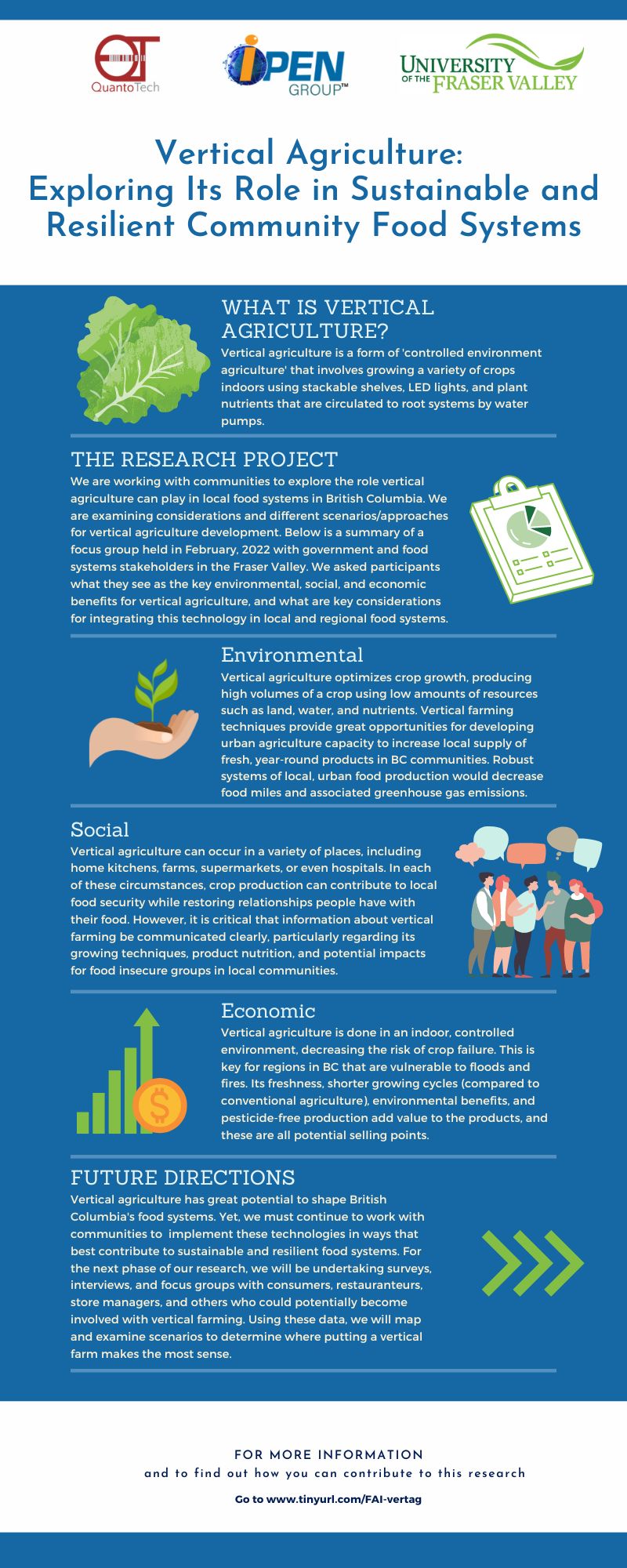The Potential Role of Vertical Agriculture in Sustainable and Resilient Community Food Systems
Project Description
This project is being conducted in collaboration with QuantoTech Solutions Ltd. and i-Open Technologies Inc. The research is driven by pressing needs for finding innovative ways of addressing food system vulnerabilities and increasing resilience in the face of climate change and economic shocks, issues that relate to and are compounded by the farm succession and food supply/distribution challenges associated with conventional agriculture. A potential approach for addressing these growing challenges is to explore options for widespread implementation of urban agriculture by adopting vertical farming and controlled-environment agriculture methods. Such farming methods could possibly provide an avenue for sustainable food production, distribution, and access, where technology-driven (but also inclusive and resilient) food production systems can be developed in ways that align with environmental, economic, and food security objectives.
DOWNLOAD SUMMARY REPORT
DOWNLOAD PROJECT POSTER
DOWNLOAD SURVEY REPORT
DOWNLOAD PLANNING PRESENTATION
Research Approach and Objectives
The research conducts farm-level experiments that grow lettuces using a hydroponic system under variable light intensities, nutrient compositions, and other conditions. The purpose of the experiment is to identify optimal growing conditions for enhancing food nutrition and yield and reduce operating costs and carbon footprints.
The research also conducts community-level analysis to gain insights into consumer and food vendor (groceries and restaurants) preferences regarding vertical farming and accessing vClick to enlarge/download pdfertically-farmed products. This aspect of the project involves integrating both the farm- and community-level data using a map-based platform, Agrilyze, to identify the environmental, social, and economic implications of scaling-up and developing vertical farms in different neighbourhoods throughout case study communities in British Columbia. The final phase of the project engages local governments, economic development, and food security stakeholders in dialogues around scenarios and potential trajectories for developing vertical agriculture in a manner that contributes to resilient and sustainable community food systems.
The aim of this research is to generate evidence-based knowledge on best practices that reveal both opportunities and existing/emerging challenges for broad-based adoption of vertical farms as components of sustainable food systems. This project builds on interdisciplinary knowledge and studies in community sustainability and food systems vulnerabilities, as well as practical solutions for addressing sustainable food systems challenges.
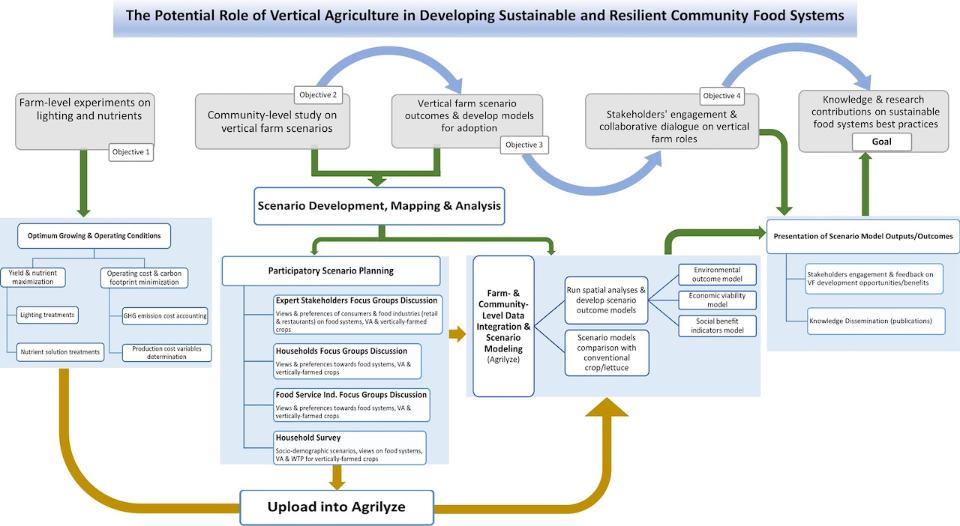 |
Click to enlarge/download pdf
Data Map
Click to open fullscreen map
What can I see in this map?
The Agrilyze-based map above features spatial data produced from and related to this research on vertical agriculture and local/regional food systems. Data will be continually added to the map as the project progresses.
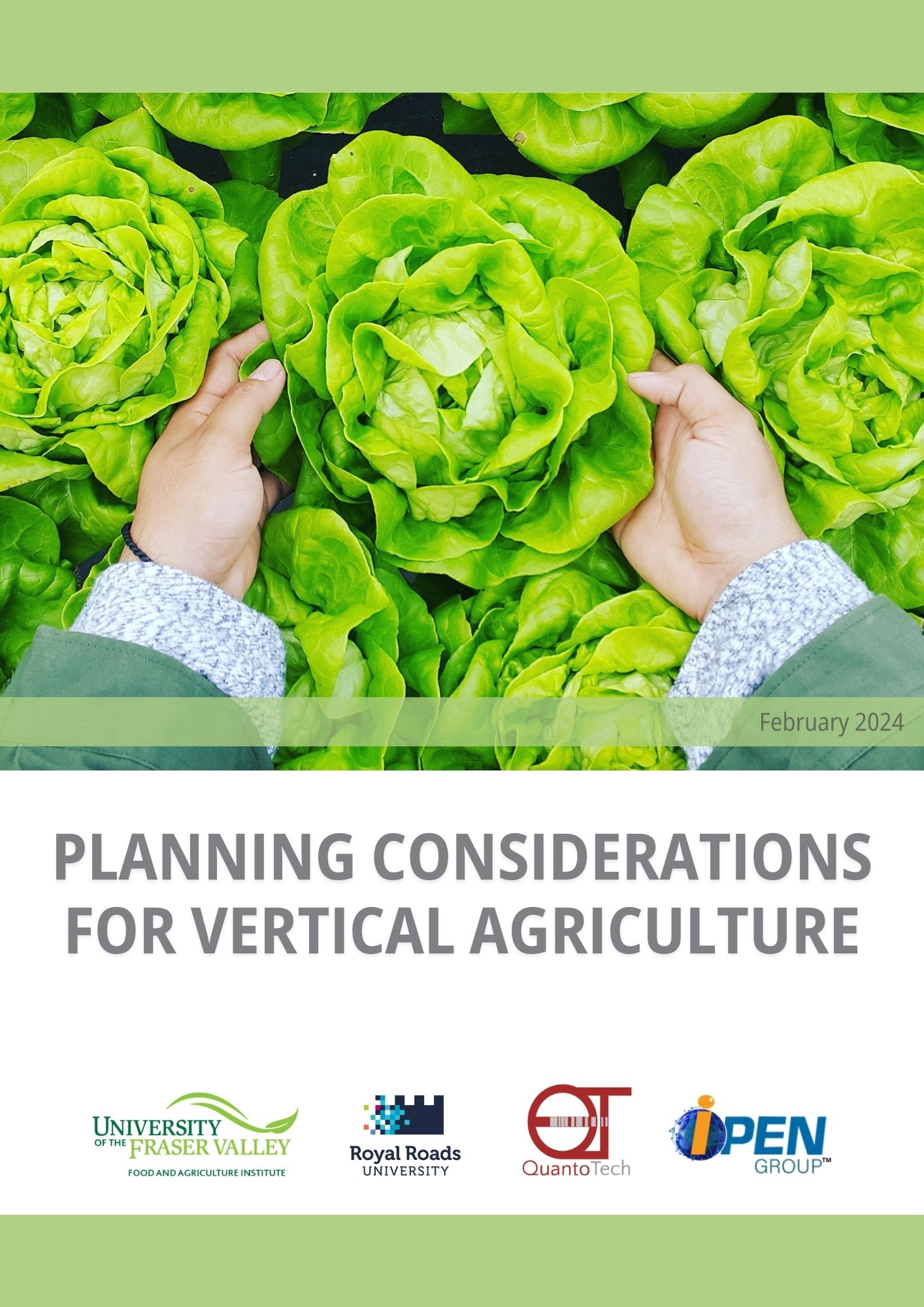
Planning Considerations for Vertical Agriculture
As an emerging approach to food production, there is a need to examine the implications that vertical agriculture holds for local food systems planning. Indoor, controlled environment growing is compatible with a variety of land uses, making it both an opportunity and source of tension for community food activists, organizations, and city planners. This study engages food systems stakeholders and local government to explore these opportunities and tensions. Building on a previous vertical agriculture site suitability and scenario mapping study, we conducted a workshop in December 2023 with twelve individuals with roles in the development and functioning of food systems in the Lower Mainland region of British Columbia. The main objective of this work was to better understand practical land use and planning considerations for this emerging approach to food production.
Glaros, A., Pizzirani, S., Newell, R., & Newman L. (2024). Planning Considerations for Vertical Agriculture. University of the Fraser Valley, Abbotsford, Canada.
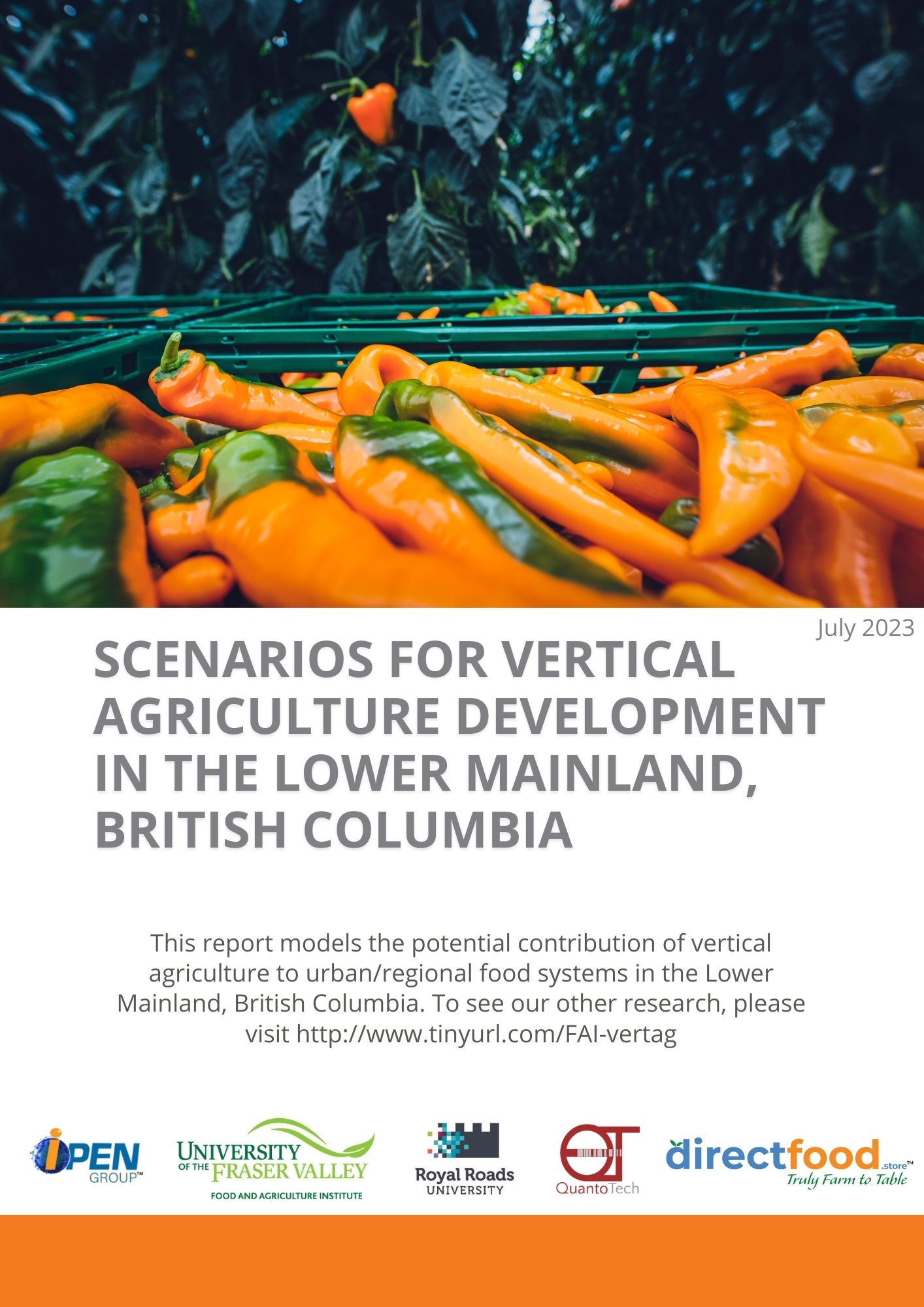
Scenarios for vertical agriculture development in the Lower Mainland, British Columbia
The city-region has emerged as a key focus for food system planning, with substantial public interest in developing local (i.e., urban, peri-urban, and regional) networks of food production and distribution in ways that contribute to urban food security and ecosystem services. To date, very little research has modelled the potential impacts of vertical agriculture in these local food systems. As an emerging approach to urban food production, it is important to consider what role vertical agriculture can play in the urban and regional agricultural landscape. To this end, this research examines six scenarios for vertical agriculture development in the Lower Mainland, British Columbia. It models the potential food security and environmental implications of establishing up to 100 vertical farms across the region in different development patterns.
Glaros, A., Newell, R., & Pizzirani, S. (2023). Scenarios for vertical agriculture development in the Lower Mainland, British Columbia. University of the Fraser Valley, Abbotsford, Canada.
Vertical Farming Innovation: Improving Food Security & Conserving Biodiversity
Stefania Pizzirani, Robert Newell, Alesandros Glaros, Saeed Rahman, and Lenore Newman explore vertical farming as a pathway to biodiversity conservation. They provide three guiding principles for how vertical agriculture can conserve biodiversity: (1) diversification in produce, (2) localized, decentralized farming, and (3) integration with other social, economic, and physical systems. The authors then apply these principles in practice across several business models in vertical agriculture. They conclude by describing how management practices, complementary technologies, and policy collaboration are key to successful vertical farm implementation.
Pizzirani, S., Newell, R., Glaros, A., Rahman, S., & Newman, L. (2023, April 04). Vertical Farming Innovation: Improving Food Security & Conserving Biodiversity. Amplify 36(3).
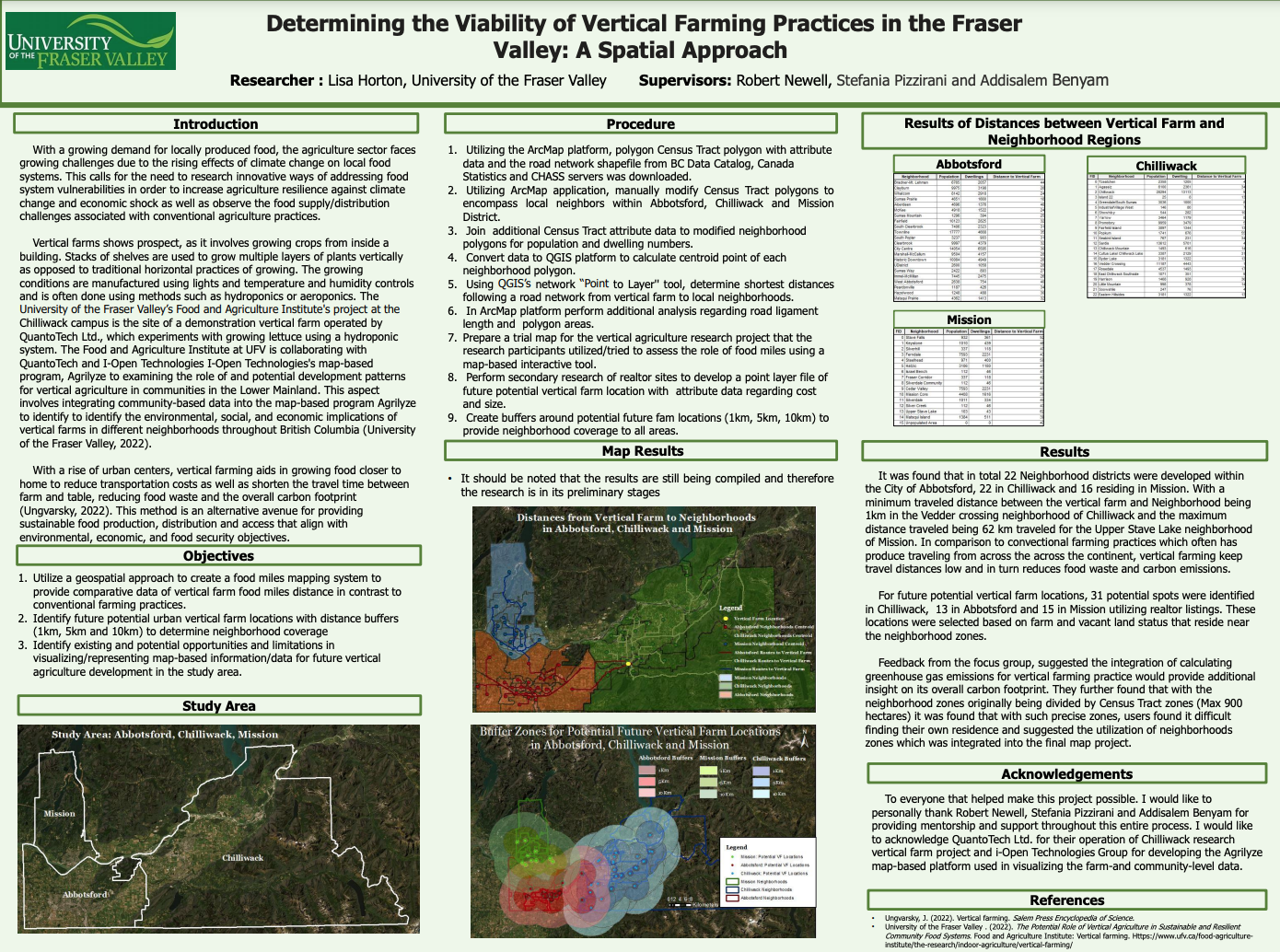
Determining the viability of vertical farming practices in the Fraser Valley: A spatial approach
This poster presentation describes a spatial exploration of the role of vertical agriculture and potentially viable locations of vertical farms in Fraser Valley communities. The activity had three objectives: (1) employ a geospatial approach to create a food miles mapping system to provide comparative data of vertical farm food miles distance in contrast to conventional farming practices, (2) identify future potential urban vertical farm locations with distance buffers (1km, 5km, and 10km) to determine neighbourhood coverage, and (3) identify existing and potential opportunities and limitations in visualizing/representing map-based information/data for future vertical agriculture development in the study area.
Horton, L. (2022, March 31). Determining the viability of vertical farming practices in the Fraser Valley: A spatial approach [Poster presentation]. University of the Fraser Valley Student Research Day 2022, Abbotsford, Canada.
Vertical Agriculture in the Fraser Valley
This poster presents the role that vertical agriculture can play in local food systems in British Columbia. The poster describes different scenarios and considerations for vertical agriculture development and deployment in municipalities, and spans three domains including (1) Ag-tech perceptions, (2) Willingness to try/buy vertically grown product, and (3) Food system planning, and includes future work of this partnership between the Food and Agriculture Institute, Royal Roads University, QuantoTech, and i-Open Technologies.
Glaros, A. (2023). Vertical Agriculture in the Fraser Valley. [Poster presentation]. Presented at Abbotsford City Hall.
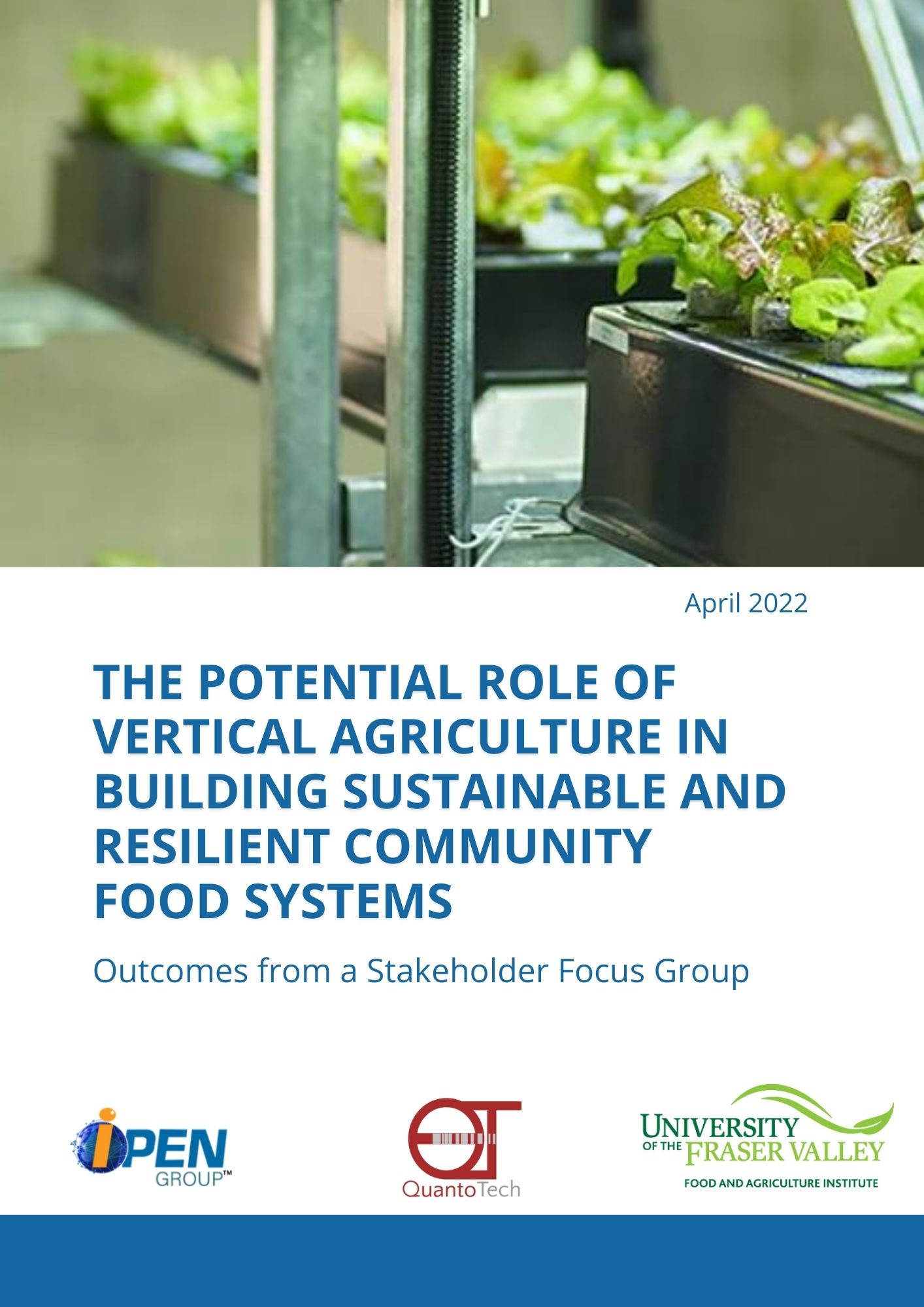
The potential role of vertical agriculture in building sustainable and resilient food systems
This report presents a summary of the first activity of our research, where we facilitated a taste test exercise and online focus group with government, NGOs, community organizations, and industry stakeholders associated with food systems in the Fraser Valley (particularly Mission, Abbotsford, and Chilliwack). The focus group occurred in February 2022, and prior to the session, participants were asked to try vertically-farmed lettuce to get a sense of the characteristics and quality of the products. In addition, participants were given links to an informational webpage and interactive food miles map for comparing vertically-farmed and conventionally-farmed lettuce. In the focus group, participants were asked for their feedback regarding the clarity and efficacy of the web information/tools. Discussion then ensued about the products and various considerations for integrating vertical agriculture into local and regional food systems in the Fraser Valley.
Benyam, A., Newell, R., & Glaros, A. (2022). The potential role of vertical agriculture in building sustainable and resilient food systems: Outcomes from a stakeholder focus group. University of the Fraser Valley, Abbotsford, Canada.
Vertical agriculture: Exploring its role in sustainable and resilient community food system
This poster was developed based on research that engaged communities in the Lower Mainland to explore the role that vertical agriculture can play in local food systems in British Columbia. The project examines considerations and different scenarios/approaches for vertical agriculture development, and the poster summarizes the outcomes of a focus group held in February 2022, with government and food systems stakeholders in the Fraser Valley. Participants discussed what they see as the key environmental, social, and economic benefits for vertical agriculture, and what the key considerations are for integrating this technology in local and regional food systems.
Glaros, A., & Newell, R. (2022). Vertical Agriculture: Exploring Its Role in Sustainable and Resilient Community Food Systems[Poster]. University of the Fraser Valley, Abbotsford, Canada.
QuantoTech Ltd.
QuantoTech Ltd. operates the vertical demonstration, located at the UFV’s Chilliwack campus, which is used in this research. QuantoTech is committed to raising consumers awareness in sustainable food systems by using novel technologies and producing pesticide-free and nutritious crops year-round that is accessible and in close proximity to consumers, as well as comparable to conventionally-farmed foods with respect to price. As a partner in this research effort, QuantoTech is also committed to advancing public knowledge, community development/outreach, and environmental responsibility in food systems approaches. QuantoTech contributes funding to support this research.
i-Open Technologies Group
i-Open Technologies Group developed the Agrilyze map-based platform used in and visualizing farm-and community-level data. The application of Agrilyze to map vertical farming scenarios enables examinations of the food supply, economic, and environmental potential of vertical farms as an urban agriculture solution. In addition, Agrilyze is used in this research as an educational tool for showing the potential of vertical agriculture in terms of factors such as food miles, with such tools being used for stimulating thinking and dialogue around vertical farms and food asset planning at local, regional, and/or provincial levels. The i-Open Technologies Group contributes funding to support this research.
Funding
This project is supported by the Mitacs Accelerate Program.

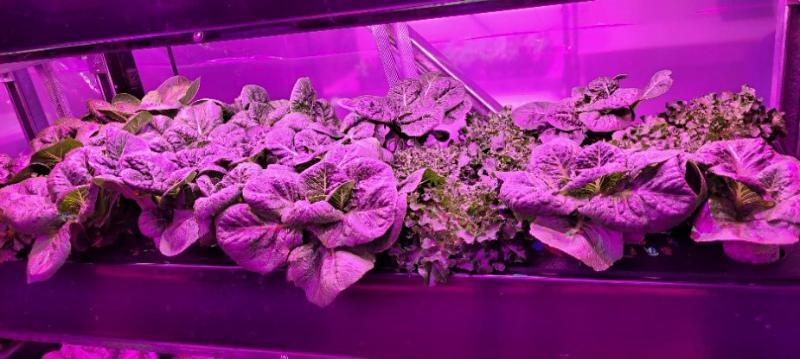



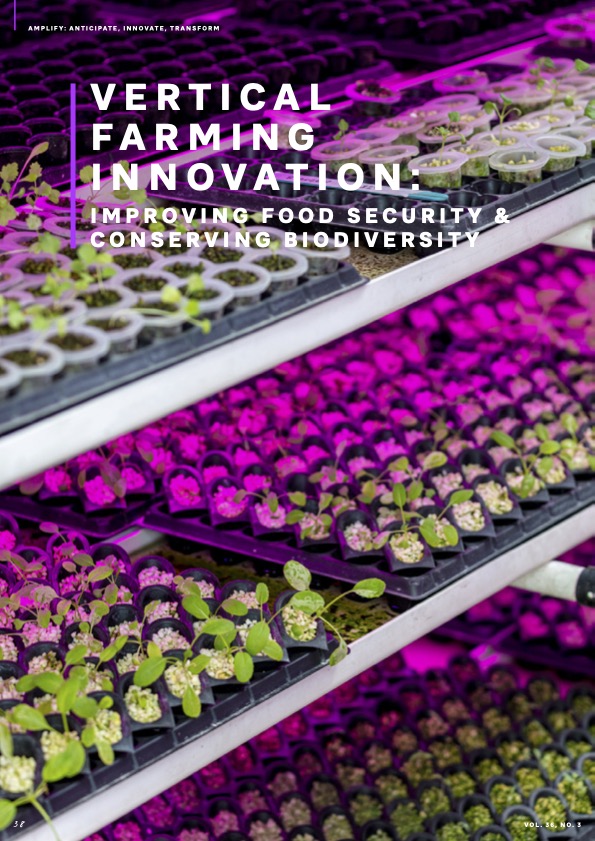

.png)

